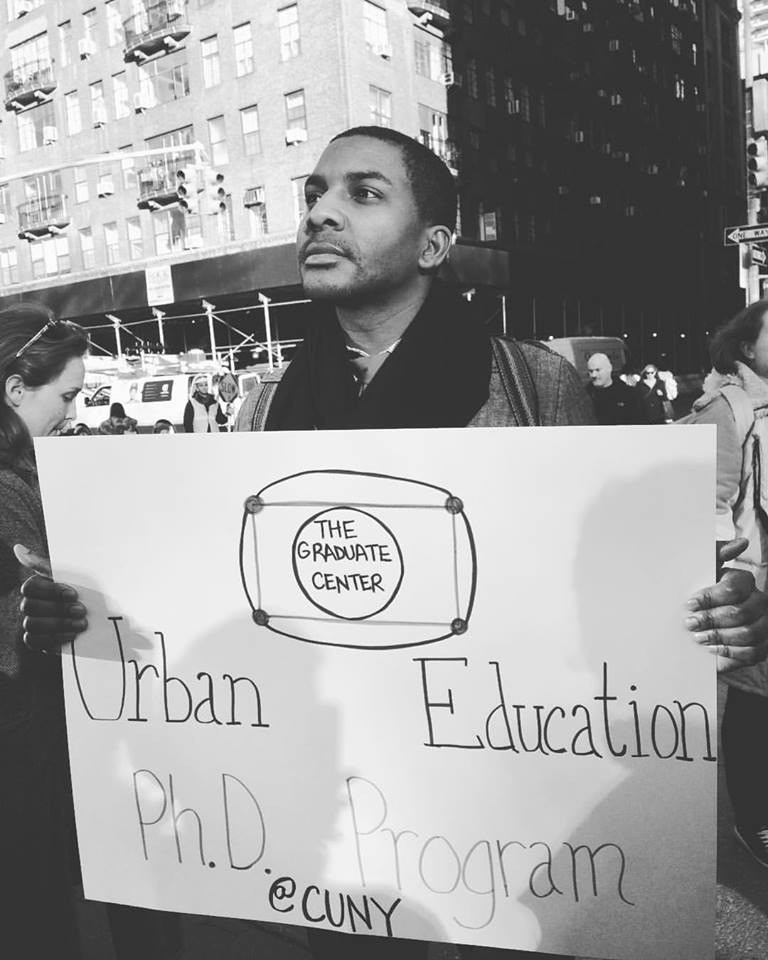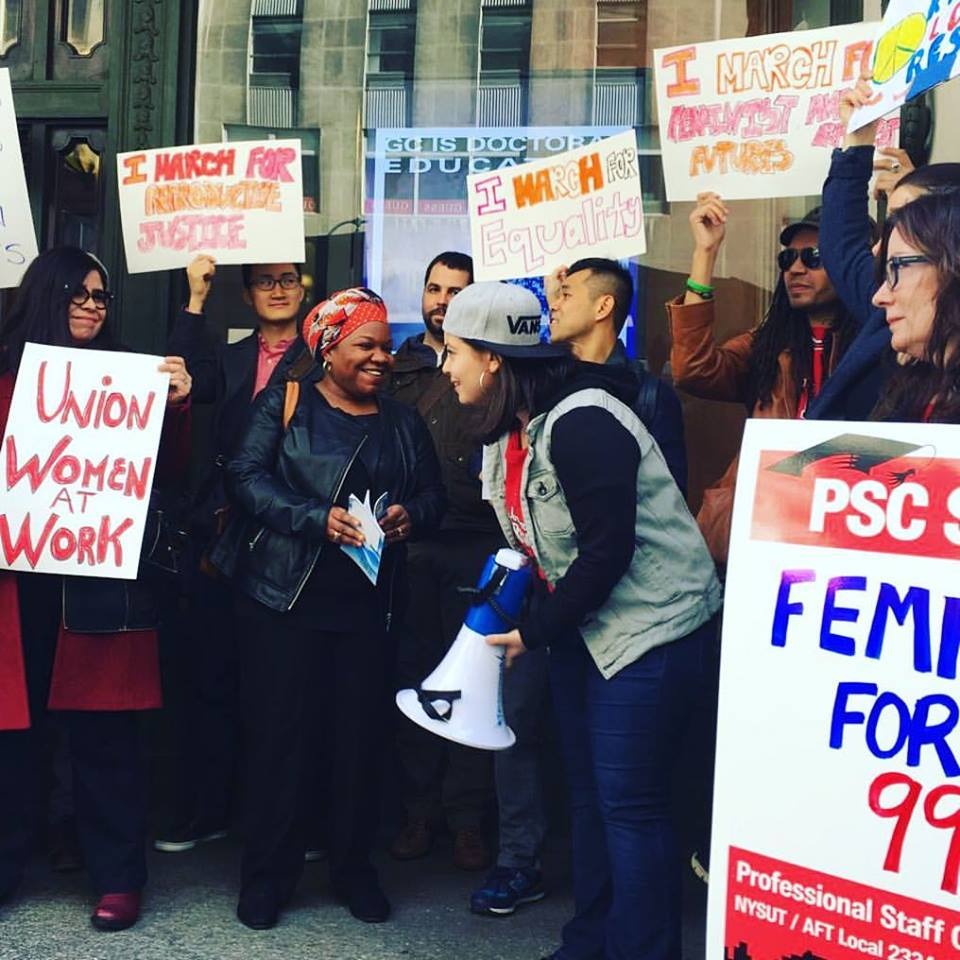Image by Marisa Holmes
This article was orginally published in The Advocate
2017 has been marked with increasing attacks by racist & nationalist regimes, including the most recent Trump administration. The Muslim ban, proposed & expanded border wall, increased police brutality, immigrant deportations, injustice at Standing Rock, dismantling of environmental and economic regulations & push to defund healthcare, all come as increasing attacks on working and immigrant communities.
The attacks are an extension of what the globalizing world has endured for decades: forced separation & migration, rising neoliberal cuts and war spending, increased police violence & human and economic exploitation. We’ve seen revolutionary movements abroad and increased waves of resistance here in the U.S. A social movement is brewing: Where do we go from here?
El Pueblo Lucha : CUNY Fights
CUNY’s students are 500,000, primarily working class & immigrant students, who come from communities around the world. More than half come from low-income families earning [less than $30,000 a year].
Many come from economic & war-torn regions, fleeing for survival and the need for a new life. 62% of CUNY faculty teach over half of CUNY courses (70,000 per academic year) and earn $3,500 per 3-credit course, for an average yearly salary of $30,000 in a city with upwards of $1,200 per month for rent alone. They work as highly educated & skilled precarious labor, without adequate support for professional & research development and with little respect & recognition from their tenured track peers. They are the generation of professors teaching our next generation of youth on how to solve the problems of climate change, war, disease & disaster torn areas, religious & ethnic conflict and increasing uncertainty & economic instability. This is the adjunct nation, whose administrative counterparts at CUNY earn upwards to $300,000 to $700,000, plus stipends for lavish high-end living.
From 2000 to 2015, the number of adjunct faculty increased by 73%. Marc Edelman, Anthropology professor at Hunter College, writes that CUNY’s “top administrators’ salaries continue to climb. The budget is balanced on the backs of faculty, workers, and students, who pay rising tuition for an education that is ever harder to deliver.” Edelman cites the $51 million shortfall last year and 3% across-the-board cuts at senior colleges with per pupil funding 17.4% below 2008, inflation adjusted. For years, the New York Post has covered a number of corruption cases around CUNY’s 25-campus wide system. Baruch College athletic director & basketball coach, Machli Joseph was found stealing more than $500,000 from the school.Former City College President Lisa Coico resigned last year after being found guilty for stealing research-foundation funds for personal use. Kingsborough faces federal discrimination lawsuit for accusations of racial slurs towards Jewish community with questions on misuse of campus grant funds & rental fees.
City Tech was similarly found with accusations of racial discrimination and misuse of administrative funds. Two top CUNY officials left their posts after a November investigation by State Inspector General for “waste, fraud and abuse and any unethical or illegal activities.”
Frederick Schaffer, CUNY’s general counsel, announced his retirement after the investigation went public. Jay Hershenson, the vice chancellor of university relations and the secretary to the board of trustees, stepped down from his post to assume a new role at Queens College. The list goes on.
Meanwhile, the Professional Staff Congress’ New “Progressive” Caucus, who’ve enjoyed union leadership power since 1995, failed miserably at a 6-yearlong contract battle, in exchange for a poor 1-year contract, after 92% of members voted yes to strike.
With union elections taking place at several campuses this month, the 22 year long New Caucus is likely to return to power again, yet with hope for representation from a movement seeking a more genuine grass roots & democratic approach to labor organizing.
CUNY Struggle

Delegate candidates from CUNY Struggle Caucus slate explain an open bargaining resolution at the Chapter Election Debate.
For the past two years CUNY Struggle (CS) has organized to create a more democratic & engaged union that is run directly by its members, with adjunct issues central to its organizing. On April 5, the eve of the GC chapter elections, the CS Caucus slate successfully debated the Graduate Center’s New Caucus slate, also known as the New Caucus and Fusion Independents (NCFI). CS presented its resolution for open bargaining sessions, to be proposed at the PSC May Delegate Assembly.
The resolution would make bargaining sessions more open to members, with frequent, detailed reports after every session. Additionally, it would create proportional representation for all work titles on the bargaining team. For example, if adjuncts make up 55% of union membership, 55% of the bargaining team should be adjuncts. At the debate, both slates urged for the immediate need to engage members around the upcoming Supreme Court Janus v. AFSCME case, a right to work ruling, which would eliminate agency fees and allow individuals to benefit from collective bargaining without contributing to the union.
Both slates pressed for the immediate need to organize around a new contract, one that would include 7K per course for adjuncts. Members of the audience and the CS slate pushed NCFI as to reasons for aligning with the 22 year long New Caucus, who repeatedly has failed to act on behalf of adjuncts and in general, widely disconnected from its 27,000-worker base.
Despite their differences, both slates, along with long-time adjunct coalitions & organizers, successfully created the Committee for Adjuncts and Part Timers (CAP) in February. CAP evolved from “First Fridays,” a PSC committee that advocated for adjuncts within PSC’s governing body for over twenty years. The newly formed CAP continues adjunct advocacy with an emphasis on connecting adjuncts and part time workers CUNY wide. The goal is to create adjunct committees on each CUNY campus to expand adjunct membership & representation in PSC leadership and the bargaining team. Additionally, it aims to initiate a CUNY wide campaign for improved job security, pay parity, and working conditions. In conjunction with members from both CUNY Struggle and the New Caucus and Fusion Independents, CAP has successfully worked with new and existing adjunct committees at Lehman, La Guardia, Hunter, Baruch, Bronx Community College, School for Professional Studies and Medgar Evers.
Both slates criticized the 2017 New York State Budget and Governor Cuomo’s Excelsior Scholarship, which would keep state funding for CUNY senior colleges essentially flat. With no renewal for Maintenance of Effort to cover rising operating costs, the majority of new funds for CUNY will come from tuition increases of $1,000 over the next five years, paid by the students who do not qualify for the Excelsior Scholarship. Additionally, undocumented students would continue to remain excluded from financial aid.
The increased immigrant bans, raids and deportations under the Trump administration, have spurred many across CUNY towards organizing around the CUNY as Sanctuary campaign. With the help of CUNY CLEAR (Creating Law Enforcement Accountability and Responsibility), CUNY Citizenship Now and the PSC, students and faculty across CUNY campuses have organized know your rights workshops and discussions on how to address ICE raids, student data concerns and police presence on campuses. The ACLU, the NYCLU, and CUNY CLEAR filed Raza v. City of New York in June of 2013, challenging the New York City Police Department for discriminatory and unjustified surveillance of CUNY Muslim students.
The proposed settlement establishes reforms to protect Muslims and others from discriminatory and unjustified surveillance by NYPD. Students and faculty from various groups including Students Without Borders, Coalition Against Student Deportations, CUNY Democratic Socialists of America & CUNY Resists Trump, continue to seek cross-campus coalition building towards protecting CUNY students from potential future attacks and making CUNY a Sanctuary campus.
A Day Without Immigrants
The increase in immigrant raids and forced deportations led SEIU United Service Workers, numerous immigrant organizations, including the Fair Immigration Reform Movement (FIRM) & Movimiento Cosecha, to call for “A Day Without Immigrants,” in commemoration of this year’s May Day. Coalitions across the country ask workers, in honor of immigrants, to strike and protest U.S. exploitation of immigrant labor, especially the 11 million undocumented, more than half from Mexico alone.14] Maria Fernanda Cabello, spokesperson from Movimiento Cosecha (Harvest Movment), says the 400,000 committed strikers on May 1st demand “[permanent protection from deportation for the 11 million undocumented immigrants; the right to travel freely to visit our loved ones abroad, and the right to be treated with dignity and respect.”
In solidarity with immigrant activists, students and faculty, including Nancy Fraser, David Harvey, Judith Butler, Cornell West, Etienne Balibar and others, call for a May 1st moratorium on all normal university operations across the U.S. The pledge calls for teach-ins, demonstrations, boycotts, marches and protests in lieu of regular coursework: “We call on university administrators and faculty to cancel classes, close offices, and postpone maintenance to demonstrate our solidarity with immigrant workers and our support for thoughtful strategies of resistance.”
While the PSC encourages its members to participate by including May Day in class discussions, it has not yet endorsed the nation-wide moratorium to cancel classes and shut down university operations.
International Women’s Strike

Urban Ed PhD Students successfully petitioned their department to cancel most classes for March 8 and organize GC rally for International Women’s Strike.
Building on the momentum of the January 21st Women’s March on Washington, women around the world called for an International Women’s Strike or “A Day Without a Woman,” on March 8th, International Women’s Day. Women around the world called off work & refused to engage in domestic labor. Prominent feminists such as Angela Davis, Keeanga-Yamahtta Taylor, Rasmea Yousef Odeh and GC Professor, Linda Martín Alcoff joined the strike. With inspiration from Argentinian coalition Ni Una Menos (Not One Less) they work towards a feminism for the 99% that is anti-capitalist and anti-violence against women from debt, discriminatory state policies, mass incarceration, abortion bans and lack of access to free healthcare.
Because of the hundreds of teachers and employees who refused to work, districts of Prince George’s County, Maryland; Alexandria, Virginia; and Chapel Hill, North Carolina, cancelled classes on March 8th. In Providence, Rhode Island, the municipal court closed due to lack of staff. In Washington, D.C., 20 female legislators walked out of the Capitol.
Urban Education PhD students successfully petitioned their department to cancel most classes as part of the Women’s Strike. They held a rally and speak out in front of the Graduate Center, with faculty & students sharing poetry, testaments and demands for reclaiming women and workers’ rights. Tatiana Cozzarelli, Urban Education PhD student and one of the main organizers, spoke on the importance of refusing our labor as leverage for power. The key question, she says is: “How do working-class women who make up the movement, organize a strike in their workplace?”

Walk Out!
Credit: Jesse Rappaport
Inspired by the May Day Moratorium and Urban Education’s successful closure for March 8th International Women’s Strike, Graduate Center organizers met with students from the New School, NYU and Barnard to call on faculty, staff and students for a city-wide walk out on May 1st. Since the Haymarket affair in Chicago, 1886, May 1st has been a day for working-class protest and workplace actions. The 2006 “Day Without an Immigrant” protests successfully pushed back Bush-era assaults on immigrant workers.
This year’s May Day and “A Day Without an Immigrant,” similarly seek to mobilize thousands and garner strength towards building a movement of worker resistance. From CUNY Struggle, GC Democratic Socialists of America, FREE CUNY, the Adjunct Project, CUNY Rising, the Doctoral Student Council, the First 100 Days, the New Caucus and Fusion Independents, CUNY Sanctuary & GC Resist Trump. CUNY activism is on the rise and particularly here at the Graduate Center.
Students, faculty and staff are engaging with the question: Where do we go from here? The hope for May Day is to bring together our organizing efforts and demonstrate the power of workers refusing our labor and uniting for emancipation. City College alumnus, Assata Shakur urges us: “It is our duty to fight for freedom. It is our duty to win. We must love and support each other. We have nothing to lose but our chains.”.
We must consider why, whom and what we fight for, how our efforts connect with struggles around the world, and the strength & courage needed to see the ideological chains that divide us. It is pertinent now more than ever to ask: How do we come together to strengthen our efforts across organizations and campuses to reclaim our democracy?
Credits to Comrades: Tatiana Cozzarelli, Conor Tómas, Anh Tran, Juan Ferre, Andy Battle, Khanh Le, Erik Forman, Joseph van der Naald, Travis Sweatte, Jarrod Shanahan, Doctoral Student Council, GC Resist Trump & PSC GC Chapter.










